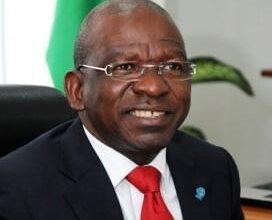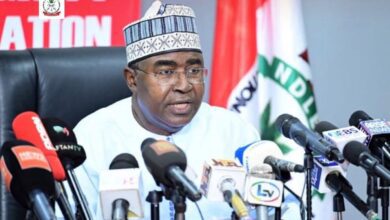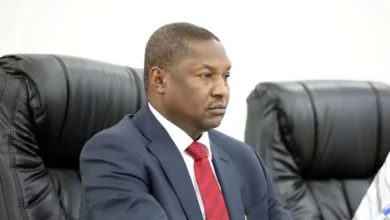Illegalities In MDAs Responsible For High Cost Of Governance -ICPC

The Chairman of the Independent Corrupt Practices and Other Related Offences Commission, ICPC, Professor Bolaji Owasanoye, has named illegalities in Ministries, Departments and Agencies (MDAs) as factors responsible for the high cost of governance in the country.
Owasanoye made the revelation on Tuesday, 30th November, 2021, while delivering a speech at the 3rd National Summit on Diminishing Corruption In The Public Service and Presentation of Public Service Integrity Award held at the State House Conference Centre (Old Banquet Hall), Presidential Villa, Abuja, as well as virtually on the Cisco Webex App.
TheFact Nigeria reports that the event, organized by the ICPC in collaboration with the Office of the Secretary to the Government of the Federation, OSGF, is themed ‘Corruption and Cost of Governance: New Imperatives for Fiscal Transparency’, and beamed the torchlight on corruption and cost of governance at sub-national levels, corruption and cost of governance in the health sector and corruption and cost of governance in the execution of government projects.
Owasanoye, in his speech noted that President Muhammadu Buhari, had, on a number of occasions, acknowledged that his government had inherited a number of challenges since 2015 when he assumed office, among which are an empty purse and no savings.
The ICPC chief disclosed that a major aspect of the challenges was the astronomical cost of governance both at Federal and sub-national levels. These have continued to reflect in the huge wage bill on personnel and operational cost, which consumes a whooping 70% of the annual budget.
He further disclosed that factors contributing to the high cost of governance and rising personnel budget include illegal recruitment, illegal and unilateral increase in wages and remuneration by some MDAs. Others are indiscriminate local and international travels, unreasonable demands by some political appointee Board members of MDAs, who exhibit disregard for extant circulars on cost management, procurement fraud and budget padding amongst others.
Furthermore, investigation by the Commission of some cases of illegal recruitment as received from Head of the Civil Service of the Federation has so far implicated the Ministry of Labour and the University College Hospital, Ibadan, and a number of corrupt staff of their MDAs at a lower level. This abuse of power, Owasanoye said, is made possible by the complicity of compromised elements in the Integrated Payroll and Personnel Information System, IPPIS. Cases are currently under investigation.
On another level, Owasanoye went on, a syndicate of corrupt individuals within the Service, was discovered to be in existence, whose stock-in-trade, includes corruptly employing unsuspecting Nigerians, issuing them fake letters of employment, fraudulently enrolling them on IPPIS and posting them to equally unsuspecting MDAs to commence work. He said that the Commission is currently prosecuting one of the leaders of the syndicate from whose custody was retrieved several fake letters of recommendation purportedly signed by the Chief of Staff to the President, Honourable Ministers, Federal Civil Service Commission and other high ranking Nigerians.
Owasanoye also intimated the President on the 3rd phase of the Commission’s projects tracking which covered 1,083 projects across the entire country with the exception of Borno and Zamfara States due to security reasons.
He said that the excercise had led to the initiation of enforcement actions against not less than 67 contractors, who have been forced back to site, as well as ensured the completion of 966 projects worth N310bn, some of which were hitherto abandoned.
The ICPC chairman added that this same malady of corruption also affected executive as well as zip projects, thus undermining government projections, escalating the cost if governance and denying the country value for money. Other manifestations of these maladies are poor needs assessment, the resultant effect of which is a disconnect between the projects and beneficiaries, false certification of uncompleted contracts as completed, deliberate underperformance of contracts, incessant criminal diversion and conversion of public property by civil servants, among many others.
Other challenges of governance, Owasanoye revealed, relate to the duplication of projects in the budget. For instance, the Commission review found that 257 projects amounting to 20.138bn naira were duplicated in the 2021 budget. The Commission, upon the discovery, submitted an advisory to the Minister of Finance, who took action that prevented abuse.
Owasanoye intimated that, according to the Commission’s Ethics and Compliance Scorecard of MDAs report for 2021, only 34.6% of the 360 MDAs assessed scored above average in Management Culture and Structure, which he said,bus not unrelated to the inability of unstable Boards to effectively oversee their institutions.
While commending government’s posture against Illicit Financial Flows (IFFs) that drain resources from the nation, Owasanoye stressed that the time to further block leakages was now, in the face of dwindling and practically threatened government revenues.
He said that ICPC was contributing to government’s efforts through its IFF focused projects, which have resulted in a major advisory to government with recommendations including prohibiting confidentiality clauses that facilitate fraud and money laundering, prevention of tax evasion, prohibition of illegal tax waivers and all practices that undermine government revenue projections.
Prof. Owasanoye further intimated that the IFF Inter-Agency Committee has organised a number of capacity building programs on how to avoid fraud and IFF-prone agreements.
On the way forward, the ICPC Chairman advised that government invest more in prevention and behavioural change strategies alongside law and order measures to fight corruption. ‘This is important if we are to maximize the gains of prevention and the wisdom that prevention is better than cure’, he said.
He added that the Commission, in collaboration with development partners, notable among whom are Ford Foundation For IFFs and MacArthur Foundation For Behaviour Change, was putting more attention to these areas in the months ahead.
He acknowledged and thanked President Buhari on behalf of the Board, Management and Staff of the Commission, for his encouragement, motivation and leadership, and for providing the much needed political will required for any anti-corruption initiative to succeed.
He pledged the commitment of the Commission to continue to do its best in the interest of the nation, and in line with its statutory mandate.





